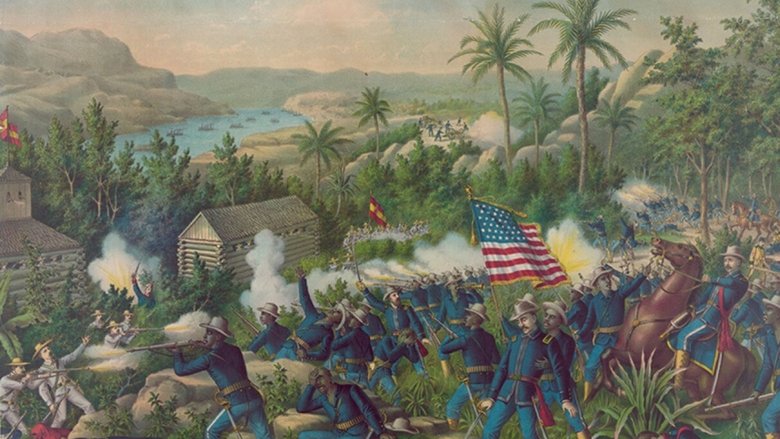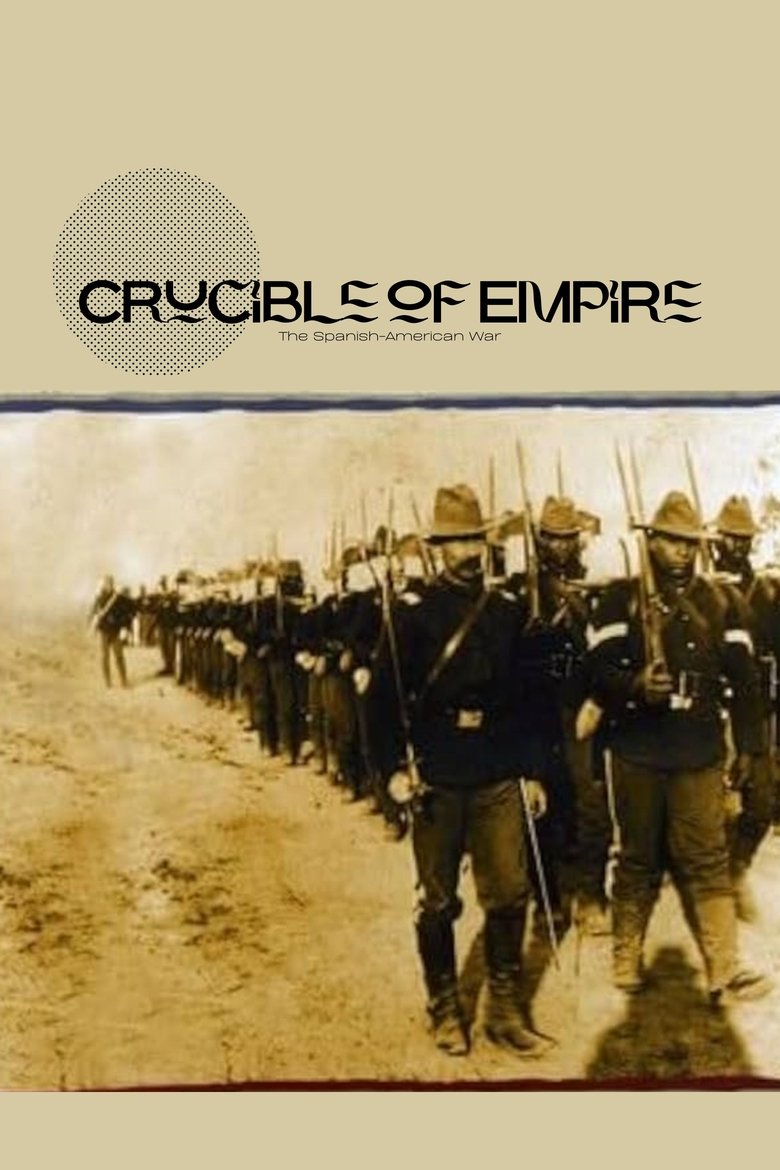Loading


Crucible of Empire: The Spanish-American War
Genres
DocumentaryHistory
Overview
Crucible of Empire demonstrates how and why the Spanish-American War constitutes such an important milestone in U.S. history. This program examines the events and attitudes that led to war, followed by an exploration of the conflict and its outcome. Early film footage and stills of battle scenes, plus rich visuals, a compelling story, and intriguing analogies to current foreign policy make Crucible of Empire a riveting documentary.
Details
Budget
$0
Revenue
$0
Runtime
120 min
Release Date
1999-12-30
Status
Released
Original Language
English
Vote Count
0
Vote Average
0
Cast
Meet the talented actors who bring the movie to life.
Similar Movies
Explore movies similar to this one that you might also enjoy.
4.0
Pedro Calungsod: Batang Martir
Pedro Calungsod, a young Filipino man, leaves his Visayan native roots to join the Spanish Jesuit priest Fr. Diego de San Vitores in his mission to the Marianas Islands (Guam) in 1668. The San Diego Mission arrives in the Marianas where the young Pedro, a trained catechist and mission assistant, begins work for Fr. Diego de San Vitores in baptizing the Chamorro natives, preaching the holy gospel and spreading the good news of salvation through the Christian faith amidst paganism, doubt and disbelief. Despite the longing for his father and the threats to their lives, even at the peril of death, Pedro and Fr. Diego continued their missionary work. They roamed the dangerous islands and baptized many more natives and continued to enlighten them about Christianity.
2013-12-25 | en
6.4
The Good Shepherd
Edward Wilson, the only witness to his father's suicide and member of the Skull and Bones Society while a student at Yale, is a morally upright young man who values honor and discretion, qualities that help him to be recruited for a career in the newly founded OSS. His dedication to his work does not come without a price though, leading him to sacrifice his ideals and eventually his family.
2006-12-11 | en
10.0
Personal Che
A documentary that explores the myth behind the truth. Different people around the globe reinterpret the legend of Che Guevara at will: from the rebel living in Hong Kong fighting Chinese domination, to the German neonazi preaching revolution and the Castro-hating Cuban. Their testimonies prove that the Argentinian revolutionary's historical impact reverberates still. But like with all legends, each sees what he will, in often contradictory perspectives.
2007-09-01 | en
5.8
Appointment in Tokyo
Produced by the Army Pictorial Service, Signal Corps, with the cooperation of the Army Air Forces and the United States Navy, and released by Warner Bros. for the War Activities Committee shortly after the surrender of Japan. Follow General Douglas MacArthur and his men from their exile from the Philippines in early 1942, through the signing of the instrument of surrender on the USS Missouri on September 1, 1945. Preserved by the Academy Film Archive in 2013.
1945-12-07 | en
0.0
Hen. Gregorio Del Pilar
A biopic about general Gregorio Del Pilar.
1949-11-24 | tl
0.0
Dagohoy
Dedicated to the valiant Boholano hero Francisco Dagohoy, this film shows the real causes that impelled the Dagohoy Uprising.
1953-06-04 | tl
0.0
Diego Silang
This movie captures the core and colorful saga of the famous Ilocano hero Diego Silang.
1951-08-19 | tl
0.0
Gabriela Silang
Gabriela Silang a Filipino revolutionary leader best known as the first female leader of a Filipino movement for independence from Spain
1971-11-24 | tl
0.0
Andres Bonifacio Ang Supremo
A story about the Philippine revolutionary Andrés Bonifacio, the founder and Supremo of the Katipunan.
1964-02-28 | tl
7.9
Hearts of Darkness: A Filmmaker's Apocalypse
A chronicle of the production problems — including bad weather, actors' health, war near the filming locations, and more — which plagued the filming of Apocalypse Now, increasing costs and nearly destroying the life and career of Francis Ford Coppola.
1991-11-27 | en
6.3
The Other Francisco
Based on the novel Francisco by Anselmo Suárez y Romero, "The Other Francisco" is a socio-economic analysis of slavery and class struggle through the retelling of the original novel. The film contrasts the romantic conceptions of plantation life found in Suárez Romero's novel with a realistic expose of the actual historical conditions of slavery throughout the Americas. It offers a critical analysis of the novel, showing how the author's social background led to his use of particular dramatic structures to convey his liberal, humanitarian viewpoint.
1975-01-02 | es
0.0
El día más largo
2011-01-01 | es
0.0
Daimara y el Baile Zombie
2025-01-28 | pt
0.0
Padre Burgos
This film reenacts the martyrdom of the Gomburza, high-lighting the events and occurrences prior to their execution. The movie focuses on the story of Fr. Jose Burgos and his involvement in the Cavite Mutiny of 1972.
1949-12-04 | tl
0.0
Heneral Paua
Out of our glorious historical past comes this story of a Chinese General who unselfishly gave everything to help the Philippine Revolution.
1956-05-09 | tl
7.0
YAYA
YAYA is a story about a filmmaker who explores the complex relationship between his family and the domestic worker who spent decades away from her family in the Philippines to raise his. This documentary is a tribute to all the domestic workers in Hong Kong, who has served as the backbone of Hong Kong's economy by unleashing a substantial female workforce into the economy and taken care of so many lives with love and care. You are all heroes in the hearts of the Hong Kong people. - Justin Cheung, the director
2018-12-09 | en
7.0
Amistad
In 1839, the slave ship Amistad set sail from Cuba to America. During the long trip, Cinque leads the slaves in an unprecedented uprising. They are then held prisoner in Connecticut, and their release becomes the subject of heated debate. Freed slave Theodore Joadson wants Cinque and the others exonerated and recruits property lawyer Roger Baldwin to help his case. Eventually, John Quincy Adams also becomes an ally.
1997-12-10 | en
7.5
Buena Vista Social Club
In this fascinating Oscar-nominated documentary, American guitarist Ry Cooder brings together a group of legendary Cuban folk musicians (some in their 90s) to record a Grammy-winning CD in their native city of Havana. The result is a spectacular compilation of concert footage from the group's gigs in Amsterdam and New York City's famed Carnegie Hall, with director Wim Wenders capturing not only the music -- but also the musicians' life stories.
1999-06-04 | en
0.0
Fredens port
In a culture where cremation is unusual, cemeteries fill up rapidly. In Latin America and in some other places, to solve the problem, remains are frequently exhumed. In Cuba, two year after interment. Relatives are invited to observe the little ritual. The music of the film is drawn from requiems from different periods. Twelve pieces by seven different composers are quoted. Together, they make up a traditional requiem, although only a few passages from the "dies irae" have been included, and other sections are slightly abbreviated.
1996-12-01 | en
0.0
Baon Sa Biyahe
The Jeepney is a common affordable transportation in the Philippines. Made from abandoned American Jeeps during World War II, the Jeepney remains a symbolic figure of the Philippine identity.
2022-12-21 | tl